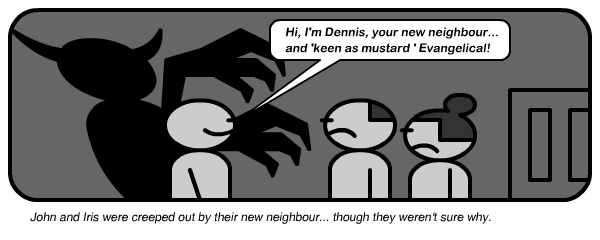
I've a long-running, occasionally dipped-in-to discussion with the man-myth-legend Bob about the definitions of things. In life, we don't like labels. I think a major reason for this is because the moment we find one that seems to fit us, we invariably then find ten other people, none of whom we would ever want to have anything to do with, who seem to be appropriating the same label.
Perhaps I'm being harsh here, but then when we have this discussion, it's usually against the backdrop of theological nomenclature. That is, the labels placed on us as members of the worldwide body that comes in the wake of God's ongoing intervention into humanity's history. Reformer, catholic, non-subscribing, presbyterian, anglican, baptist, anabaptist, calvinist, arminian, pentecostal. The list goes on. All of us who belong to the Church in some way or another assume a label, even it's hermit, agnostic, or survivor. It could be argued that none of these are permanent for us; in our meandering journey of discovery, our figurative walk with God, be that left, right, towards or away from, we exist in a constant state of flux between these labels.
I find one I struggle with the most to be 'evangelical'. Hit up Wikipedia and you'll get the four 'key commitments' of the Evangelical movement, born in the British Isles in the mid 18th century:
- 'The need for a personal conversion to the Christian faith';
- A high regard/respect for the authority of the Bible (note that this does not necessarily equivocate to infallibility, but more the notion of biblical inerrancy)
- 'An emphasis on teachings that proclaim the saving death and resurrection of' Jesus Christ, recognised as the Son of God;
- 'Actively expressing and sharing the gospel'
If you're not a God-botherer, then you might well say that sounds broadly like all Christianity. It actually doesn't, but that's a statement for better thinkers than I to tear apart.
But there's a problem. I would strongly identify with those statements. Does that make me an evangelical? It sounds tempting. But you know all those right-wing types in America? Well, they're evangelicals too. They voted for Sarah Palin. I know. Know those churches that seem to exist in a parallel universe from the neighbourhood they're in? They say they're evangelical. The church I grew up in would claim some evangelical types, and there's freemasons on the vestry. Evangelical - really? You still want to be one of those, part of a body that includes Tea Party activists and closet believers and cultish types, churches which spend £30,000 on a new porch when there are kids destroying themselves nearby for the want of someone to actually give them some guidance in life?
But there's a problem with that too, because of course, that's not what the word means. More, like everything it life, it's what we as the people who embody it have become. In many ways, I desperately want to admit to calling myself an evangelical, but the baggage that comes with that (much like calling yourself a Christian) that stymies the words before the make it out of my mouth.
This morning (with a h/t to the Rend Collective's twitter feed) I came across Greg Fromholz attempting to deal with this discussion. It's great to have creative, left-brain thinkers like Greg attempting to deal with this stuff in a way that we normal folk can engage with, so I've shamelessly republished it here. But I'll throw in a heavy plug for his digital book, Liberate Eden which will mess with your head in amazing ways.
--

No comments:
Post a Comment